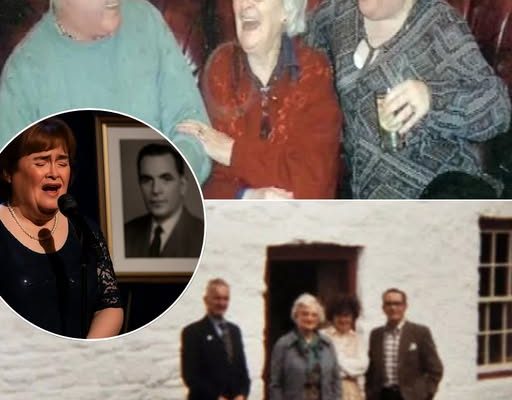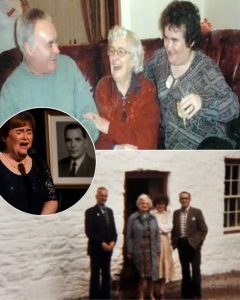He never heard me sing when he was alive,” she said. “And I think part of me never forgave myself for that.” In a raw and emotional revelation, Susan Boyle has opened up for the first time about the abuse she endured as a child — confessing that her father physically beat her, and that for most of her life, she could never bring herself to sing for him. Until now. As the final note faded, Susan stood silently — no applause, no words. Just the sound of her father’s memory… and her voice finally breaking through the silence..
Britain’s Got Talent star Susan Boyle has opened up about her traumatic childhood, revealing that her father used to hit her.

“My father, though a very good man, had a temper,” the 55-year-old singer told the Mail on Sunday. “He showed it to me and he hurt me.
“He didn’t mean to, but I held onto this for years and, when he was dying, I had to let it go. You have to accept it. That’s maturity
Susan’s dad was a miner who moved from Ireland to Scotland and served in the Second World War as a sergeant major in the Royal Engineers. He died in 1997, ten years after her mum Bridget.

“It’s not easy, but you have to let it go and replace it with a new self. That’s what I’ve been focussing on over the past six months. It’s difficult. I’ve been coming to
terms with it.”
A close family friend confirmed that the star had suffered abuse at the hands of her dad, saying: “Yes, her dad was heavy handed. It was due to his time in the war.”
Since coming second on Britain’s Got Talent in 2009, the Scottish singer has racked up an estimated £25million fortune – but still lives in the modest family home where she was brought up in Blackburn, West Lothian.

She’s about to release a new album of romantic songs called A Wonderful World, with the songs hand-picked for her by Simon Cowell.
But despite the subject matter, Susan herself is still single – although she does keep in touch with a doctor she met in Florida.
“Potentially it’s not finished,” she said. “I’d like to see him more. But I’m very busy and it’s been a long time. But I would like someone. I’m very sensitive… [but] sometimes I can be hard to get.”
In a special appearance at a small church in her hometown of Blackburn, Susan Boyle stood in front of a hushed audience, her voice trembling not from nerves — but from the weight of what she was about to do. With only a single piano behind her, she dedicated her performance to the man who shaped so much of her early life — both through love and fear.
“My father never heard me sing,” she told the audience, tears in her eyes. “Not properly. I was too scared. He never asked… and I never offered.”
What followed was a haunting rendition of “You Raise Me Up,” and it moved everyone in the room — including Susan — to tears.
Boyle, now 63, had long hinted at a difficult childhood, but only recently found the strength to tell the full story. “He wasn’t a bad man,” she said in a recent interview. “But he had a temper. And I was the one who got the worst of it.”
Growing up in a crowded house as the youngest of nine children, Susan often bore the brunt of her father’s frustrations. Diagnosed as having a “learning difficulty” after birth (a label later disputed), she struggled with bullying both at school and at home. But music was her secret escape — one she kept hidden from the man whose approval she both feared and longed for.
“He never heard me sing when he was alive,” she said. “And I think part of me never forgave myself for that.”
Now, decades after his passing, Susan has found a way to reconcile with her past — not through confrontation, but through the very gift she was once afraid to share.
Susan Boyle’s tribute wasn’t just a performance — it was a release. A long-overdue expression of pain, grief, and healing wrapped in music. And for those who listened, it was a reminder that forgiveness doesn’t always arrive with a shout. Sometimes, it comes in a single, quiet, powerful song.
As the final note faded, Susan stood silently — no applause, no words. Just the sound of her father’s memory… and her voice finally breaking through the silence.




